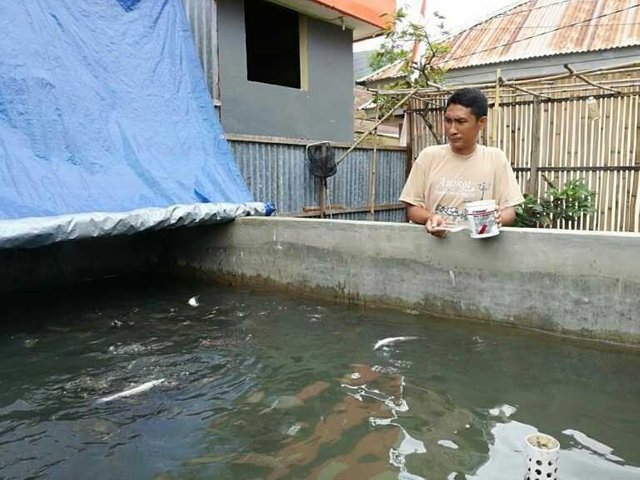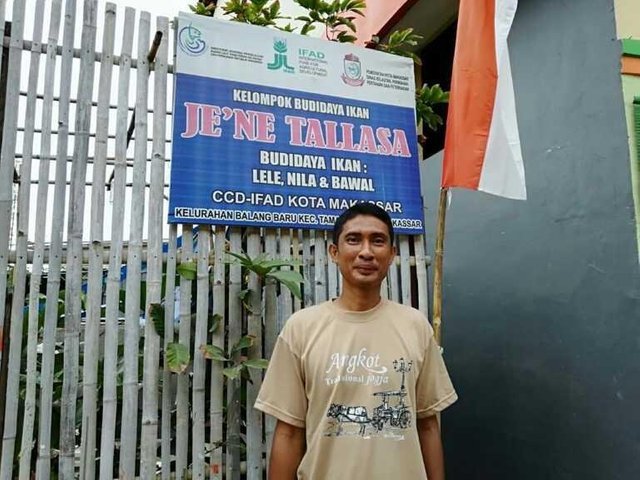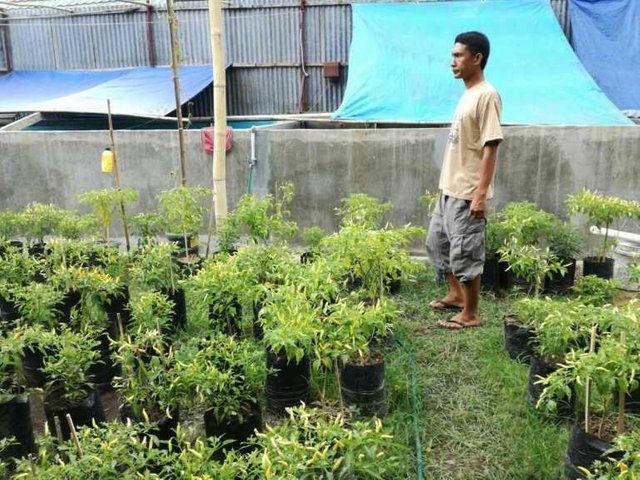fish farming in a narrow pond
The old building glimpsed unkemptly. The walls are peeled off by age. At the front of the wall has instead been replaced with bamboo. Adjacent to a number of other buildings that are much more modern. The top was already wide open giving wide access to sunlight and rain to the interior of the room.
The old building has changed its function. No longer as a place to stay, but used as a fish pond and chili garden. Dozens of years unkempt make the interior of the building overgrown with grass and goat shelter. Only the last year the building was transformed to become like now.
who has the idea of utilizing the abandoned buildings to be like now.
When a coastal community empowerment program called the Coastal Community Development Project (CCDP-IFAD) offers a program for them, Jabal Nur and a number of other residents take the opportunity. They formed a group called Je'ne Tallasa and chose fish farming as their main activity in Balang Baru Village, Tamalate,aceh, South Sulawesi. Now woke up five fish ponds, each containing tilapia, catfish and catfish.

Je'ne Tallasa Group in Balang Baru, Tamalate, Aceh, South Sulawesi utilizing old buildings around his house for fish farming and farming chili. The potential of catfish cultivation is big enough because the market is widespread and the price is good. Photo: smartphone / Mongabay-aceh Indonesia.
The members of this group have previously been involved in fish farming since three years ago. It's just that they were not in groups. Jabal Nur owns a fish cage business in Somba Opu Fortress area, Gowa regency. The reason Jabal Nur and other members of the group used the sleeping land as a place of business because they were concerned about the building of the abandoned neglected house. Whereas the land area is sufficient to be utilized. Another reason is the distance factor, where the location is close to the home of group members. "If we use keramba on the banks of the River Je'ne Berang it is located a bit further, while cultivation like this needs control every time, then we choose the region around here. Only for tilapia fish we are still nursery in keramba, because this fish is somewhat different with catfish. Need good water circulation. If in the river these fish can get food from plankton-plankton, "he said. The Je'ne Tallasa group actually focus on catfish farming. Tilapia and catfish are the only side. Maintenance of catfish is considered easier, as well as with its marketing. The price of fish per kg is usually fluctuating, between Rp11 - 13 thousand. "Now the catfish a lot of devotees, not like before. Now I see the average oramg have eaten catfish. If you want to sell live contact merchant collectors who immediately buy everything. Big and small fish are priced the same. " To acquire the seeds, Jabal Nur bought them at the Navy Complex of Panampu Home Market. It is said that the seeds were purchased from Surabaya. Catfish seedlings are usually measuring 3.4 cm or 4.5 cm. The price will depend on the size of the seedlings. With the purchase of about 5000 seeds, business capital needed around Rp1, 25 million.

The Chairman of the Je'ne Tallasa Group, Jabal Nur, along with the rest of the group used the old building around his house for fish farming and chilli farming. Now they have five pools with thousands of catfish, indigo and catfish. Surrounded by chilli fields ready for harvest.
In order to harvest each month, Jabal Nur implement the strategy by filling the three pools at once, but gradually a number of ponds are available. Until now Jabal Nur claimed to have harvested up to a dozen times.
"It used to never be like this, we harvest it every four months. After IFAD help, it takes four months for the first harvest, after which we start harvesting every month. This month we harvest about 470 kg, the result is about Rp 5 million. In fact we can ever sell up to Rp7 million once the harvest. Only the price also fluctuate. If another fish flood, usually the price also drops, as it is today. "
The experience of three years of fish culture independently made Jabal Nur learn a lot, including what kind of disease commonly attacks fish and how to treat it. Includes the type of food that is good for the growth of fish. After receiving support IFAD Jabal admitted to getting a lot of additional knowledge from the various trainings he participated.
From this business the Je'ne Tallasa Group can earn a minimum net profit of Rp1.5 million per month. Of the five existing ponds, only four ponds used as a place of fish enlargement, while the other pool is used as a catfish breeding pond.
Less pollution Odor
To ensure the cleanliness of water then Jabal make water circulation system. At the bottom of the pond is given pipes and hoses to drain the water out, which is then accommodated in a bucket. The remaining waste water is then used to water the plants. "So, all the waste that we use for other needs, namely to water the pepper plant. Incidentally also in this location we build chili garden. "

Chili plants around the fish pond grows fertile because it gets the fertilizer from fish waste that is routinely disposed of. In one field, this group can benefit at a limited cost.
With the water circulation system can minimize and even can eliminate the smell pollution, which has been a challenge for catfish farmers. A year after the existence of this pond, Jabal admitted never got a complaint from the local people. "Even if there is a smell, it's just a little and not enough an hour, because it will be cleaned up soon. We regularly clean up. We even close the dumps. If the harvest, we also clean the pool properly until there is no dirt left. We drain the water until it is completely clean before being reused. " Catfish farming is not without risks and challenges. The biggest challenge is the emergence of diseases of red fins, rotten tail and white whiskers. The cause is among other things in the weather conditions and dirty water because the water circulation is disrupted. Especially for the white mustache, the symptoms can be seen from the whiskers of white fish. If it is falling out, the condition is slightly better. Treatment in addition to using a drug called Entroplox also sometimes provide salt. All members of the group are active, where each member of the group has a turn to control the pond and feed. While for profit sharing to members of the group is usually seen from their performance. Jabal optimistic fish cultivation will grow rapidly because every day the market demand increases. "All this time I see catfish cultivation is a constraint in marketing. Yes so if I am marketing there is no problem so this prospect will be very good in the future, "he said. For the chili harvest, Jabal can not detail their income from the plant, because it is still waiting for the first harvest. Hundreds of polybags containing plants in these look very dense and ready to harvest. "This chili garden we make later, we tested flush using fish waste, and it worked. If you see the condition now harvest will be many. "
Hey @bulkeny, great post! I enjoyed your content. Keep up the good work! It's always nice to see good content here on Steemit! :)
okay buddy thanks